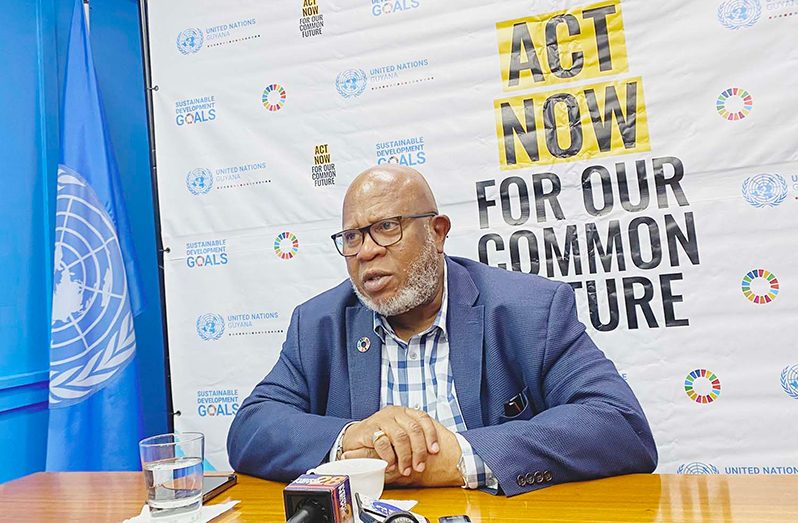–UN General Assembly President says Guyana’s Presidency of UN Security Council was ‘outstanding’
GUYANA’S distinguished role on the United Nations Security Council (UNSC) has been nothing short of “outstanding,” President of the United Nations General Assembly, Ambassador Dennis Francis has said.
In January 2024, Guyana assumed its seat as an elected member of the UNSC for a two-year term 2024-2025, and this milestone was a momentous occasion for this nation. The country also presided over the crucial global body in the month of February 2024.
During a press conference at the United Nations (UN) House on Saturday, Ambassador Francis, who was on a three-day visit to Guyana, highlighted how the nation has been using its platform to contribute to global peace and security efforts worldwide and when the nation spoke, everyone listened.
Francis highlighted Guyana’s role on this influential body which has been rooted in strengthening multilateralism.
The UN General Assembly President then said: “There’s only one word to characterise it, outstanding. Guyana made us all very proud as Caribbean states in the United Nations, in the way in which permanent representative, Carolyn Rodrigues-Birkett conducted herself as a member and in the Presidency of the General Assembly, because the presidency rotates on a monthly basis.
“…When Guyana opened its mouth, everyone listened, because what was being put forward was of such substance and depth that it could not be ignored.”
He said that Guyana on the UNSC is a prime demonstration that small countries have big contributions to make when it comes to being committed to international peace and security.
According to the UN’s official website, the Security Council has primary responsibility for the maintenance of international peace and security. It comprises 15 members (permanent/non-permanent), and each member has one vote. Under the charter of the United Nations, all member states are obligated to comply with Council decisions.

“The Security Council takes the lead in determining the existence of a threat to the peace or act of aggression. It calls upon the parties to a dispute to settle it by peaceful means and recommends methods of adjustment or terms of settlement. In some cases, the Security Council can resort to imposing sanctions or even authorise the use of force to maintain or restore international peace and security,” the UN underscored.
In February, President, Dr. Irfaan Ali underscored that given the growing inter-connectedness of global challenges, there is a pressing need for the UNSC to adopt its approach in order to uphold international peace and security.
During the country’s presidency of the UNSC in February, President Ali made this call to action.
Addressing a pivotal open debate in New York, President Ali highlighted the critical intersections between climate change, food insecurity, and peace and security, advocating for a comprehensive revaluation of how these issues are addressed on the global stage.
The Head of State began his address by outlining the multifaceted crisis at the intersection of climate change, food insecurity, and conflict.
“The challenges to international peace and security continue to evolve. And our understanding and approach to these challenges must also continue to evolve and effectively address them,” President Ali stated, highlighting the dynamic nature of global threats and the necessity for adaptive strategies.
He presented stark statistics to the council, which painted a grim picture of the current state of food insecurity, exacerbated by climate change and conflict.
With an estimated 149 million Africans facing acute food insecurity, up by 12 million from the previous year, and a significant portion of these individuals living in conflict-affected regions, the urgency of the situation was made clear.
The President pointed out that these crises often create a vicious cycle of instability, driving up the need for humanitarian assistance and further straining international resources.
Throughout his address, President Ali called for a targeted approach by the UNSC to address these interconnected challenges.
He stressed the importance of recognising the role of climate change and food insecurity in exacerbating conflict and instability, arguing that these elements are often missing from the Security Council’s analysis.
“We have done very little because we do not see the interplay. And we do not place priority on these issues as a consequence of war and conflict,” Ali remarked, underscoring the need for a paradigm shift in how the international community approaches peace and security.
President Ali advocated for the Security Council to incorporate measures that address the effects of climate change and food insecurity in its procedures, emphasising the importance of a comprehensive analysis of these impacts.



.jpg)









